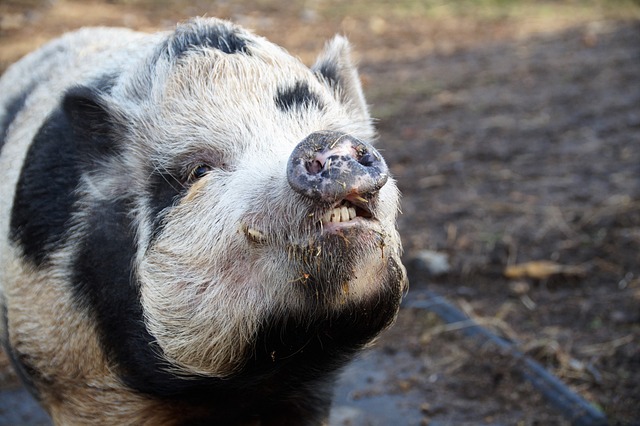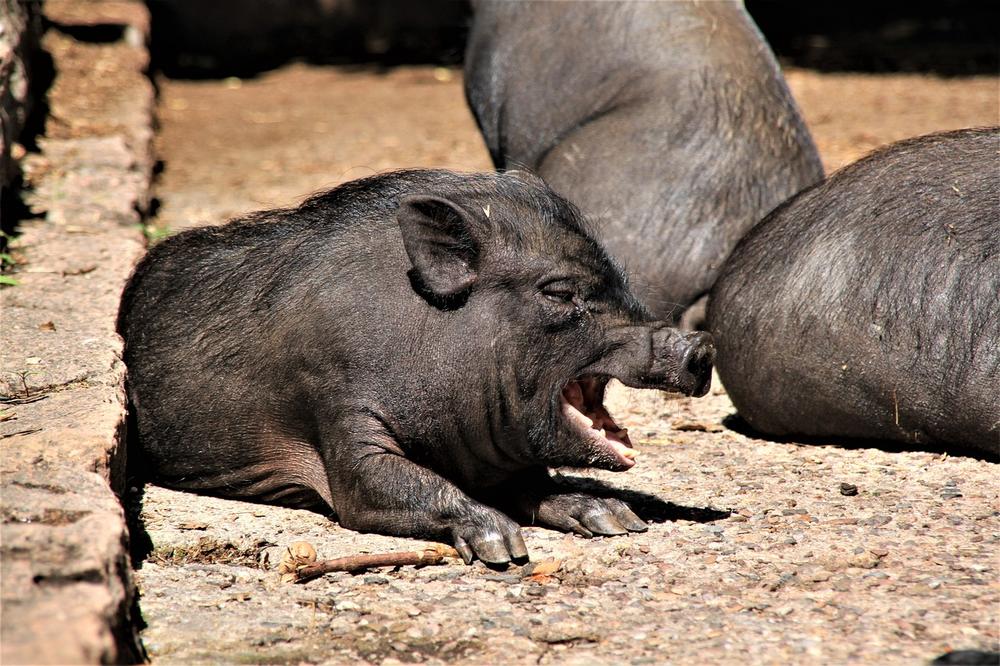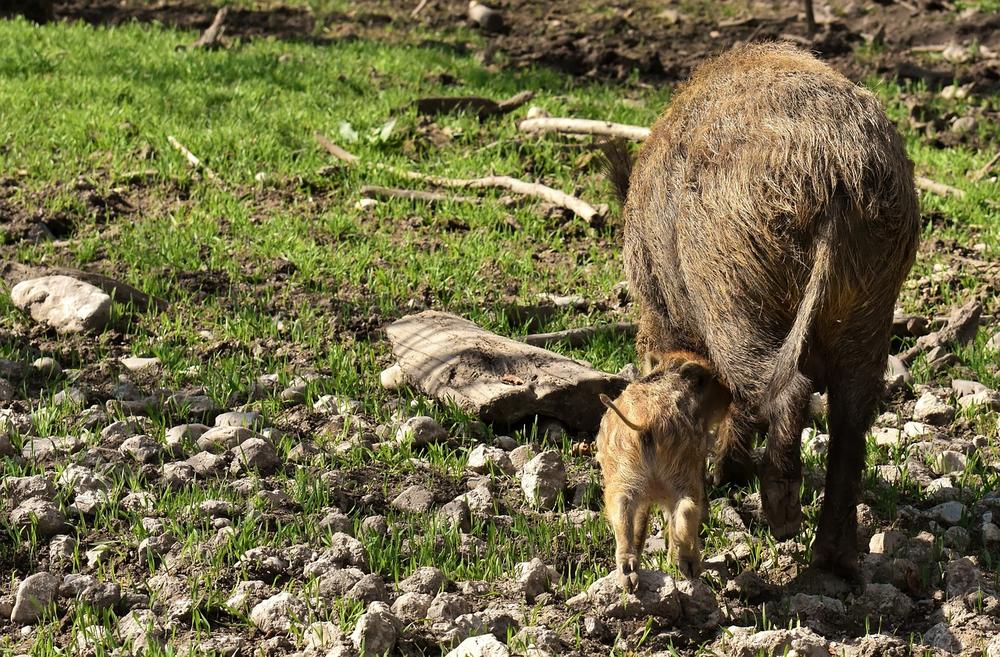Do Pigs Need Their Teeth Clipping? (The Truth Revealed!)

So, you want to know...
Do pigs need their teeth clipping?
I don't blame you for wondering.
It's a hot topic, and it's natural to have concerns about the welfare of these cute little oinkers.
You may be thinking, "But wait...isn't that painful for the poor piggies?"
Well, you've come to the right place.
Today, we'll dive into the world of pig dental care and find out if clipping is really necessary.
But first, let me assure you, there's a much kinder and gentler way to keep those pearly whites in check.
Curious?
Keep reading!
Do Pigs Need Their Teeth Clipping?
Clipping a piglet's teeth is essential to prevent harm and ensure the well-being of both the piglets and the mother pig. It is a painless procedure that eliminates the risk of injuries and infections caused by the sharp teeth.
Baby pigs often need their teeth clipped shortly after they're born to prevent any harm to themselves and the mother pig.
The clipping process is crucial for their wellbeing.
You know, these little pigs have incredibly sharp teeth in the front four corners of their jaws.
And although they may not experience pain during the clipping, those teeth can do some serious damage.
Imagine this: Piglets with razor-sharp teeth nibbling away at the poor mother pig's teats.
Ouch!
It not only causes bleeding and infection but also makes the mother pig's teats painfully sensitive.
And you know what happens then?
The piglets refuse to suckle.
But let me tell you something, my friend:
Clipping their teeth avoids all that drama.
It ensures that the piglets can feed without causing any harm to their mama.
As these little ones grow, they develop tusks—impressive ornaments sticking out from the sides of their mouth.
But here's the thing:
These tusks serve no purpose for pet pigs or livestock. So, usually by the time they reach eighteen months old, we clip them too.
Now, I'll be honest with you; the tooth-clipping process may stress out those piglets a bit.
I mean, who wouldn't feel a tad anxious when someone holds them tightly?
But always remember, we're doing it for their own good.
However, if you don't want to deal with the whole tooth-clipping procedure for these little piggies, there are a few things you could try.
Making sure the piglets receive proper nutrition is essential to ensure their teeth grow strong and healthy.
A well-balanced diet consisting of pellets, fresh hay, veggies, and fruits will do wonders.
Furthermore, offering them safe toys or tree branches to chew on can naturally wear down their teeth.
This way, their teeth won't become excessively sharp and cause any trouble for their momma. 😊
And you know what I've found? Sometimes, piglets can experience feelings of depression.
It's important to address this issue as soon as possible to ensure their well-being.
If you're interested in learning more about the causes and potential solutions for pig depression, don't hesitate to check out my blog post titled Pig Depression.
How to Avoid the Need for Teeth Clipping in Piglets
Knowing how to provide proper environmental enrichment is crucial for reducing aggression and preventing piglet injuries from their sharp teeth.
When piglets are young, they rely solely on their mother's milk and don't require their first set of teeth.

However, you should have a policy in place to identify piglets that may need their teeth trimmed.
Typically, piglets have 8 needle teeth, 4 incisors, and 4 canine teeth when they're born.
In some cases, clipping their needle teeth might be necessary.
Having assistance in holding the piglet or lips during the procedure can be beneficial. To prevent potential harm, snip the long needle teeth with a level cut just above the gumline.
Alternatives to Teeth Clipping for Piglets
Consider other options instead of teeth clipping for piglets.

These alternatives involve the use of dental devices or covers specifically designed for piglets.
- Dental devices can help prevent injury.
- The goal is to blunt the sharp teeth of piglets.
- Blunted teeth make interactions safer.
- Reduced risk of injury is a major advantage.
- With these covers, piglets can still grow a second set of teeth naturally.
- Blunted teeth will eventually be replaced by new ones.
- Avoid the risks associated with teeth clipping.
- Clipping teeth can lead to sore gums and loss of appetite.
- Teeth clipping mistakes may cause irritability or even death in young pigs.
- Consider blunting the tips of tusks for domesticated pigs.
- This can prevent feeding hindrances and facial wounds.
- Be cautious when clipping needle teeth.
- Especially if the piglets have tears or cuts on their ears.
- Tools like wire cutters or nail clippers must be used properly.
- Safety is key for both piglets and caretakers.
With these alternative methods, you can ensure the well-being of your piglets without resorting to teeth clipping.
But how can you ensure that your piglets receive proper dental care without resorting to teeth clipping?
Well, in the next section, I'll share with you the significance of regular oral examinations and explain how trimming their tusks can prevent behavior issues and even loss of appetite.
Trust me, this information will be essential for keeping your piglets healthy and happy...
So let's dive in and discover these important dental care practices together...
Tips for Proper Dental Care in Pigs
Here's the deal, taking care of your pig's teeth is super important. So here are some handy tips that'll help you out:
- You gotta check those pearly whites regularly for any weird stuff or decay.
- Trim them tusks to avoid problems and keep your pig hungry.
- Use a clean clipper and be gentle not to cut into those gums.
- If your little piggy puts up a fight, get someone to lend a hand.
- Check out YouTube, they got videos that show you how to trim teeth like a pro.
- Make sure you review the teeth reduction plan as part of the Vet's Health Plan.
- Stay cool, calm, and collected when dealing with pigs so they don't stress out.
- Show 'em some love and give 'em proper care to prevent any aggression.
- Remember, pigs establish their pecking order early on, and they might play rough.
- Take precautions to avoid any ear or scratch injuries when hanging out with your pig.
Bear in mind, good dental care means a healthy and happy pig.
Conclusion
Key Takeaways:
- Baby pigs need their teeth clipped to prevent injuries.
- Clipping helps avoid severe injuries, bleeding, and infection in piglets.
- Pigs have tusks that serve no purpose and are often removed.
- Needle-sharp teeth in piglets can damage the mother pig's teats.
- The clipping process does not cause pain but may stress the piglets.
- Piglets do not need their first set of teeth as they rely on their mother's milk.
- Implement a policy to identify piglets that require teeth reduction.
- Using a cutter, snip the long needle teeth just above the gumline.
- Teeth clipping should be done away from the mother's sight.
- Seek professional help if inexperienced to avoid mistakes.
- Teeth clipping mistakes can result in sore gums, loss of appetite, and death.
- Domesticated pigs often have their tusks removed to prevent feeding issues.
- Teeth clipping/grinding should be a last resort.
- Develop a unit-specific policy for teeth reduction in piglets.
- Clipping needle teeth is advisable if piglets have tears or cuts.
And that's all for today folks.
You made it to the end of my blog post, so let me ask you... Did you enjoy it? I spent a lot of time and effort making sure my blog posts are thorough and helpful. It's something I truly enjoy doing! If you could take a moment to click on any of the social sharing icons and share this post with others, I would be incredibly grateful. Thank you so much!
Until next time,
-Chris Campbell